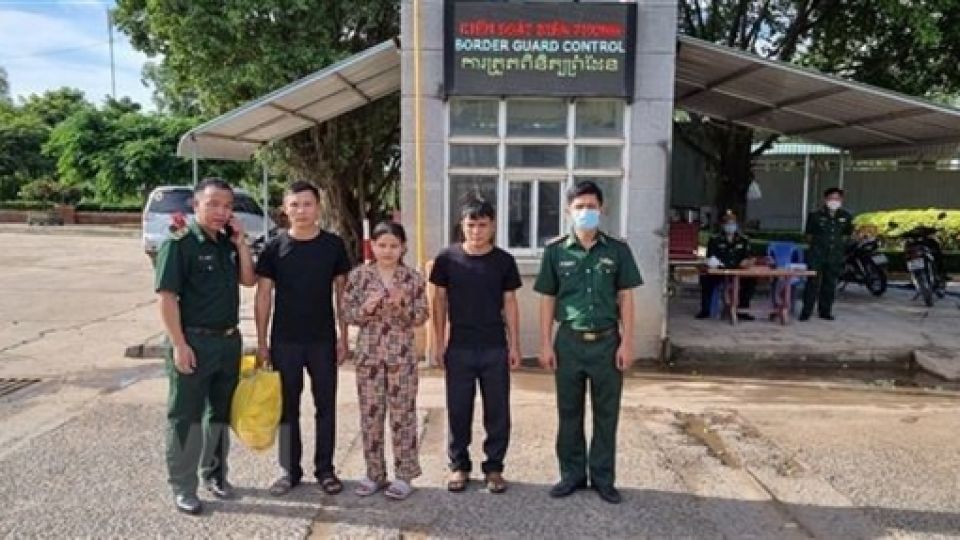August 26, 2022
KON TUM — Lured by the promise of a high-paying job abroad, countless Vietnamese people have gone to Cambodia to work and become victims of international human trafficking. Once there, they are forced to work in cruel conditions and cut off from the outside world without receiving their promised salary.
One such victim, Y Liên, was rescued by Vietnamese border guards in coordination with Cambodian government officials on August 20.
Now that she has come home safely, the 16-year-old from Ngọc Hồi District, Kon Tum Province, hopes her story will help caution those intending to travel abroad illegally to work with the promise of ‘easy work, high salary’.
“They told me that I could go there to make gaming apps for a salary of VNĐ20 million/month. I didn’t put much thought into it and agreed to go right away,” Y Liên said.
“I only realised it was not like what I had been told when I got there. The people from the company told me that workers unable to work would either be sold or crated and thrown into the sea. They also said we would be punished if we disobeyed, so I was really worried.”
Y Liên said after she arrived in Cambodia, the company arranged for her to stay in a closed area. The area included a restaurant and grocery items were sold there, just enough for sustenance. All areas were strictly guarded.
“You can’t leave. Phones were prohibited and regularly checked for, making it extremely difficult to contact our families. I borrowed my roommate’s phone to call back home. The company said we had to pay a ransom to return home, otherwise, we had to keep working for them,” Y Liên recalled.
She had to work from 13-16 hours per day, not including overtime. Her task was to befriend people on social networks and entice at least one customer a month to top up the app. Otherwise, she would be sold to another company.
Failing to meet the company’s requirements, Y Liên was sold six times to different companies at increasing prices, starting from US$1,800 ($3,620).
Throughout her entire time in Cambodia, Y Liên was not paid unless she found customers to pay for the companies’ apps. She only successfully convinced a customer once and was given a small pay cheque.
She said the company demanded VNĐ85 million for her release.
Major Bùi Công Huân, Captain of the Special Task Force for Drug and Crime Prevention of the Kon Tum Province Border Guard, was directly involved in her rescue.
He said: “The process of rescuing the victim was extremely challenging because these companies do not allow the use of cell phones.
“A few days after we received the initial call from Liên, the company had already checked and deleted the phone’s data, so it was difficult to locate the victim. In addition, she lived and ate in a closed area, with a large number of armed guards at the gates, so the victim was unable to go outside and determine the facility’s location.”
Despite facing many difficulties, the rescue plan succeeded after a month with the participation of Tây Ninh and Kon Tum Province border guard forces and the help of the Cambodian counterparts.
“When she arrived at Mộc Bài International Border Gate, Y Liên was still panicking, mentally unstable, confused and worried,” said Major Huân.
She is now in a better condition after receiving encouragement and help from her family and the local authorities.
According to Colonel Khổng Ngọc Oanh from the Criminal Police Department of the Ministry of Public Security, the phenomenon of illegally crossing borders mostly occurs in economically struggling localities, such as the Central Highlands, the southwestern border region, and several northern localities. Despite stark warnings from the government, thousands of people continue to take this risk every year.
“Many people listen to online offers, and, afraid of resistance from loved ones, decide to move abroad for the jobs without informing friends and family,” he told Tuổi trẻ (Youth) newspaper.
“This makes it even more difficult for their families and the authorities to find and rescue them.
“There is no such thing as a ‘easy job with high salary’. Workers lacking qualifications and labour and production expertise can very easily fall for the ploys of labour exploitation and fraud organisations. It is very difficult for the authorities to verify, rescue and protect citizens and bring them back to the country. Entering the facilities is easy, but returning home is very difficult.”
Colonel Oanh advises citizens to consult their families and the authorities about the destination, accompanying people, expected employment time, and specifications of all prospective jobs abroad in order to avoid falling into the hands of human traffickers. In addition, the local authorities should continue to broadcast warnings and educate people on the many ruses these crime organisations employ.
According to Oanh, the Ministry of Public Security will continue to coordinate with other agencies in verifying and dealing with instances of human trafficking, as well as in investigating and strictly handling any and all suspected violations with sufficient grounds.
The 2015 Penal Code states that the heaviest penalty for human trafficking is 20 years in prison, with the possibility of life in prison if the victim is under 16 years old.
Nguyễn Gia Liêm, Deputy Director of the Department of Overseas Labour Management, Ministry of Labour, War Invalids and Social Affairs said: “Scammers will post and share pictures of people working abroad, design website interfaces similar to reputable businesses, open offices, and organise events at big hotels.”
Therefore, Liêm recommends that workers should avoid going to work abroad in an unofficial way.


